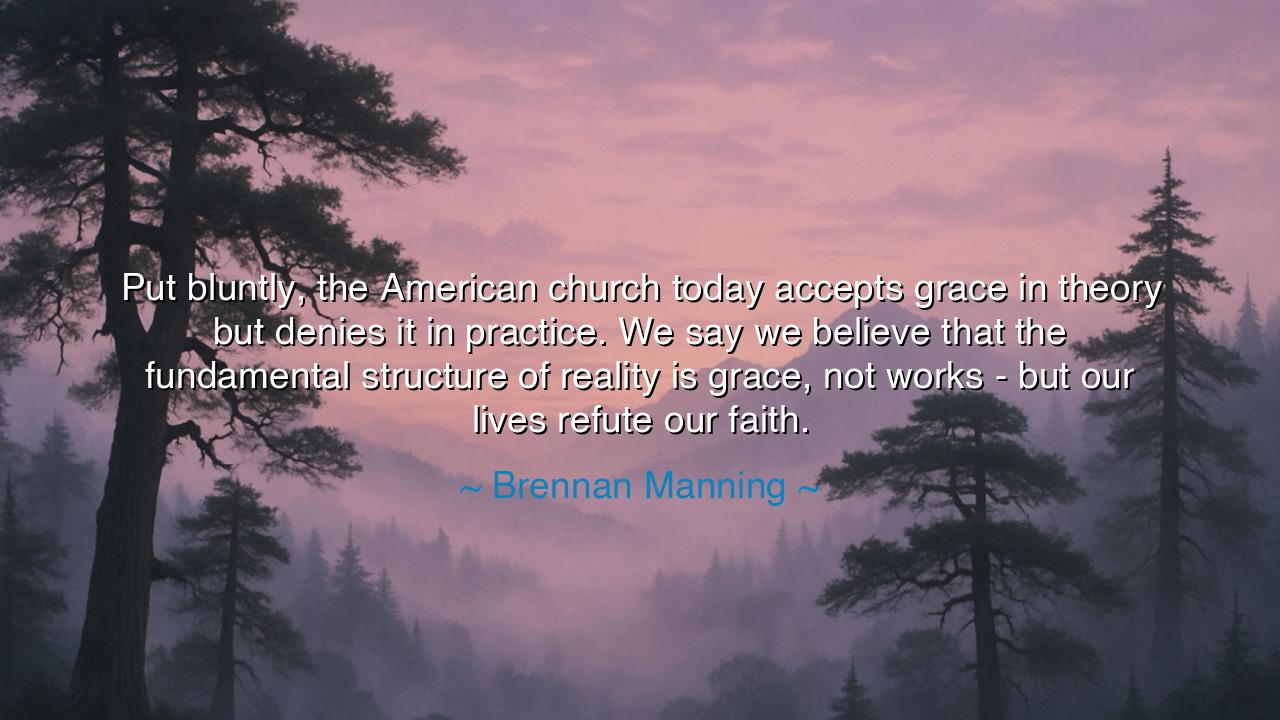
Put bluntly, the American church today accepts grace in theory
Put bluntly, the American church today accepts grace in theory but denies it in practice. We say we believe that the fundamental structure of reality is grace, not works - but our lives refute our faith.






Opening Scene
The early evening light slips through the blinds, casting soft stripes across the living room. Jack and Jeeny sit across from one another at the table, the room quiet except for the low hum of the city outside. The faint aroma of coffee lingers in the air, the warm glow of the lamp illuminating the pages of the book Jeeny has been reading. On the table between them lies a thick book, open to a passage that seems to have stopped them both in their tracks. The world outside continues its rhythm, but inside, time seems to slow as they reflect on the words before them.
Host: The room feels still, heavy with thought. Jack’s fingers rest on the edge of his coffee cup, his gaze focused on the passage. Jeeny, too, seems deep in thought, her expression more serious than usual. The quiet of the moment is filled with the weight of the words they’ve read, and it feels as though a conversation is about to unfold that goes deeper than just the text.
Jeeny: (her voice calm, yet filled with a quiet intensity) “You know, Brennan Manning once said, ‘Put bluntly, the American church today accepts grace in theory but denies it in practice. We say we believe that the fundamental structure of reality is grace, not works — but our lives refute our faith.’ Isn’t that powerful?”
Jack: (his voice reflective, almost a little unsettled) “It hits hard. It’s like we’ve lost sight of grace as the foundation of our beliefs. We talk about it, we say we believe in it, but our actions, the way we live, don’t reflect that at all.”
Jeeny: (nodding, her tone more serious now) “Exactly. It’s like we’ve created a disconnect between what we claim to believe and how we actually live. We say grace is the core of everything, but then we act as if it’s all about works, about what we do to earn approval, acceptance, or forgiveness.”
Host: The quiet between them deepens, and the world outside feels more distant, as though the conversation has pulled them into a space of reflection. The soft glow of the lamp illuminates their faces, adding weight to the seriousness of the topic. Jack leans forward, his eyes searching for understanding in the words before him.
Jack: (after a long pause, his voice almost soft) “I think I’ve been guilty of that. Of acting like grace is this abstract idea, something to talk about on Sundays, but not something that actually changes how I live. It’s like we’ve forgotten that grace isn’t something we earn — it’s something we receive. And yet, we live like it’s all up to us to make things right.”
Jeeny: (smiling faintly, her voice full of understanding) “It’s easy to fall into that trap, Jack. Especially in a culture where everything is about performance — how much we achieve, how hard we work. But grace doesn’t fit that model. Grace isn’t about doing more or earning anything. It’s about receiving, about letting go of the need to prove yourself.”
Host: The air in the room feels heavier now, the weight of their conversation settling into something more personal, more real. Jack’s fingers tap lightly against his coffee cup, the clink of porcelain against wood the only sound between them. The world outside continues, but inside, there is a quiet shift, a realization forming between them.
Jack: (his voice thoughtful, his tone tinged with acceptance) “I guess that’s the challenge, isn’t it? Accepting grace in practice, not just in theory. It’s not just about what we say we believe, but how we live it out — how we show grace to others, and even to ourselves.”
Jeeny: (nodding, her voice gentle) “Yes. Grace isn’t just something we talk about; it’s something we live. It’s the foundation of how we treat others, how we forgive, and how we recognize that we’re all broken and in need of grace, not just once, but continually. It’s about letting go of the idea that we need to earn everything, and just receiving the love and forgiveness that’s already been given.”
Host: The quiet calm between them deepens, and the world outside seems to fade into the background. Jack sits back in his chair, his expression softer, as though the realization has shifted something within him. The conversation, once abstract and philosophical, has become deeply personal. Jeeny’s words resonate in the stillness, as though they’ve touched on something fundamental, something that runs through the core of their shared beliefs.
Jack: (finally smiling, his voice warmer) “I think I’m starting to understand. It’s not about getting it perfect. It’s about letting go of the pressure to perform and just accepting the grace that’s always there, waiting for us.”
Jeeny: (with a gentle smile, her voice soft) “Exactly. And when we accept that grace, we don’t have to prove ourselves. We can rest in it, knowing that we don’t have to earn love, forgiveness, or acceptance. It’s already been given.”
Host: The quiet of the room is now filled with a sense of understanding, as if something deep has shifted between them. The world outside continues in its usual rhythm, but inside, Jack and Jeeny have found something important. They’ve come to the realization that grace is not just a concept to be understood, but a way of living, a way of receiving that transforms not only how they view the world but how they move through it. The evening continues, but inside, there’s peace — the kind that comes from accepting grace not just in theory, but in practice.






AAdministratorAdministrator
Welcome, honored guests. Please leave a comment, we will respond soon